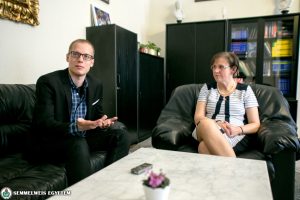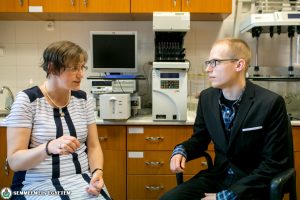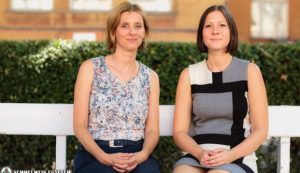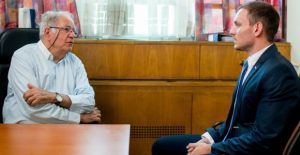Dr. Attila Marosi, who is currently a PhD student, was admitted to the Kerpel Talent Support Program among the first pharmacy students in 2009, his mentor was Dr. Romána Zelkó, Dean of the Faculty of Pharmaceutical Sciences. As they recall, the situation was new for both of them, as Dean Zelkó also started her work as mentor in the talent support program at the same time. They easily managed to establish good relations both from a human and a professional point of view. According to Dean Zelkó, the recognition of professional and human values is one of the most important results of the Kerpel Talent Support Program. She also emphasized that the program provides such a framework besides an inspirational environment, where the focus is on values.
“Besides the fixed assets, that is to say scholarships and other financial support opportunities, the talent support program also creates a community of the talented students. In the meantime, it teaches us how to remain humble: you can see many talented people around you, and some of them are successful in more than one areas at the same time.”, Dr. Attila Marosi said, who joined the talent support program seven years ago, during his university studies at third year.
 As Dean Zelkó recalled, as a mentor Dr. Marosi used to be her first student and he was not completely unknown for her, she heard a lot about him earlier. Besides his excellent academic results, as a TDK student of the Department of Pharmaceutical Chemistry, Dr. Marosi reached successful results at the university- and the national TDK conferences as well. During his research as a TDK student, he first and foremost examined the acid-base features as well as the solution structure of active agents with the help of a NMR (Nuclear Magnetic Resonance) spectroscope. He also used to participate in the graduation ceremonies as a member of the faculty’s chamber orchestra every year, he used to play the flute.
As Dean Zelkó recalled, as a mentor Dr. Marosi used to be her first student and he was not completely unknown for her, she heard a lot about him earlier. Besides his excellent academic results, as a TDK student of the Department of Pharmaceutical Chemistry, Dr. Marosi reached successful results at the university- and the national TDK conferences as well. During his research as a TDK student, he first and foremost examined the acid-base features as well as the solution structure of active agents with the help of a NMR (Nuclear Magnetic Resonance) spectroscope. He also used to participate in the graduation ceremonies as a member of the faculty’s chamber orchestra every year, he used to play the flute.
“It was a great pleasure for me that as a mentor Attila was my first student, his features and value system is exemplary. He always considers the liberty of honesty important, which is a rare value, and this is what leads him in research, in science and in his relationships with other people.”, highlighted Dean Zelkó.
Even though in the beginning there was not much connection in terms of their research work, but they already had a common professional topic during the first mentor-student meeting. Attila was just about to publish a report written by himself in Acta Pharmaceutica Hungarica, which was edited by his mentor. This way they could discuss the formal and content requirements of such a publication in an informal way instead of the impersonal e-mail exchanges. Following this, they could cooperate very well in many areas, of which the base was the good mentor-student relationship.
 They mentioned the successful program called “From the active agent to the pharmacy” as an example, which was organized for the Researchers’ Night of the Faculty of Pharmaceutical Sciences in 2013. This program was coordinated by Dr. Marosi at Dean Zelkó’s request. As they recalled, they managed to find several personal areas of connection as well besides the official mentor-student relationship. It turned out that they both belong to the same parish. Also, Attila’s father used to be the pioneer figure of a research area related to pharmaceutic formulation at Budapest University of Technology and Economics, which is one of Dean Zelkó’s main research areas as well. Thus, completely by chance, they are now also connected in scientific work, since Dr. Marosi, during his PhD years, started to deal with pharmaceutic technologies in cooperation with the researchers of Gedeon Richter Plc. and Budapest University of Technology and Economics. Therefore, now Dean Zelkó can provide him with valuable advice in this area, too.
They mentioned the successful program called “From the active agent to the pharmacy” as an example, which was organized for the Researchers’ Night of the Faculty of Pharmaceutical Sciences in 2013. This program was coordinated by Dr. Marosi at Dean Zelkó’s request. As they recalled, they managed to find several personal areas of connection as well besides the official mentor-student relationship. It turned out that they both belong to the same parish. Also, Attila’s father used to be the pioneer figure of a research area related to pharmaceutic formulation at Budapest University of Technology and Economics, which is one of Dean Zelkó’s main research areas as well. Thus, completely by chance, they are now also connected in scientific work, since Dr. Marosi, during his PhD years, started to deal with pharmaceutic technologies in cooperation with the researchers of Gedeon Richter Plc. and Budapest University of Technology and Economics. Therefore, now Dean Zelkó can provide him with valuable advice in this area, too.
The development of modern pharmaceutic forms is currently in the focus of researches, since the majority of new active agents do not have the necessary physical-chemical characteristic features. According to Dean Zelkó, the absorption is not appropriate first and foremost because of an improper solubility, and thus bio-availability. Out of the new pharmaceutical technology methods, which can ensure a much larger productivity, micro- and nanofiber formulations can provide a solution for this. Researches related to such systems are conducted at the University Pharmacy Department of Pharmacy Administration, a department led by her. Apart from this, microfibre formulations containing antibiotics are also produced for the treatment of infected wounds, which not only support the intake of active agents, but tissue regeneration as well.
 According to Dr. Marosi, this is one of the most current areas of pharmaceutic technologies. His research work focuses on the dissolving, microfiber formulation of famotidine active agent, as a model chemical compound. Currently Dr. Marosi is working at Gedeon Richter Plc., a company with which he got into contact during a summer training, but the cooperation with his mentor’s institute, as well as that of Budapest University of Technology and Economics are still ongoing.
According to Dr. Marosi, this is one of the most current areas of pharmaceutic technologies. His research work focuses on the dissolving, microfiber formulation of famotidine active agent, as a model chemical compound. Currently Dr. Marosi is working at Gedeon Richter Plc., a company with which he got into contact during a summer training, but the cooperation with his mentor’s institute, as well as that of Budapest University of Technology and Economics are still ongoing.
Pálma Dobozi
Photo: Attila Kovács, Semmelweis University
Translation: Katalin Illés-Romhányi


